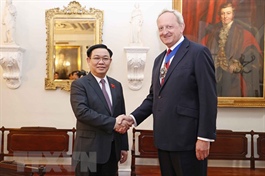Mixed views on global minimum corporate tax rate
Mixed views on global minimum corporate tax rate
The Organisation for Economic Cooperation and Development (OECD) two-pillar solution has introduced a global minimum corporate tax rate (GMCT) of 15 per cent applicable from 2023, but experts have mixed positions on the tax.

Nguyen Mai, chairman of the Association of Foreign Investment Enterprises, said that the GMCT would boost Viet Nam’s tax revenues and contain tax avoidance, tax evasion and price transferring in the country.
This is because tax rates lower than GMCT have incentivised illegal tax practices without significantly affecting investment attractiveness. In fact, 56 per cent of foreign-invested firms in Viet Nam declared unprofitability in 2020, with a total loss of VND151 trillion (US$6.5 billion), substantially reducing the country’s tax collection.
Accordingly, he urged the Government to modify tax regulations in line with the GMCT and re-negotiate with FDI investors on investment terms to prepare the country for the new tax system.
Dang Ngoc Minh, deputy director of the General Department of Taxation, thinks otherwise. He said that Viet Nam has been offering a favourable tax rate of 12.3 per cent on average. Some big multinational enterprises (MNEs) are subject to tax rates of between 2.75 to 5.95 per cent.
If the GMCT is put in place, it will make Viet Nam less attractive to MNEs tax-wise. These MNEs would become reluctant to expand their presence in the country and relocate their facilities to other regions to enjoy more favourable tax policies, causing adverse economic effects.
“Low tax rates act as an incentive for big firms to invest in Viet Nam, whereas the GMCT would rule out such incentive,” he said.
Can Van Luc, chief economist at the Bank for Investment and Development of Vietnam, underlined the GMCT as a system aimed at de-escalating the tax-based competition for foreign investment between developing countries.
He asserted that GMCT would positively and negatively impact the Vietnamese economy should the country participate.
On the one hand, the GMCT would reduce the country’s tax-derived attractiveness and disrupt the flow of foreign investment in the short term. On the other hand, it would improve Viet Nam's image in the eyes of foreign investors and allow the country's tax system to shift toward an international norm.
"The GMCT has been agreed in principle, but some details have yet to be finalised. Without detailed guidance, it would confuse MNEs once the country approves it," he added.
Dau Anh Tuan, deputy secretary general of the Vietnam Chamber of Commerce and Industry (VCCI), believes that the GMCT is more beneficial to capital-exporting countries than to capital-importing countries like Viet Nam.
"Many FDI firms have chosen Viet Nam because of political stability, low tax rates and cheap labour costs. The GMCT, undoubtedly, would mean big changes for the investment situation in the country," he added.
He suggested that Viet Nam improve human resources, reduce land rental costs, establish better logistic systems and introduce more favourable policies on technology to make up for higher tax rates if the country opts for the GMCT.
Annett Perschmann Taubert, tax partner of PWC, remarked that Viet Nam has been encouraging foreign investment using low tax rates. Unfortunately, such means no longer have the desired effects as they did in the past.
As low tax rates make no big difference to capital inflows, the country is recommended to shift from low tax rates to the GMCT to avoid tax losses. Otherwise, MNEs would redirect tax-derived benefits back to their originating countries.
Taubert said that Viet Nam should factor GMCT into its tax laws and introduce target-specific policies on investment to supersede favourable tax rates. For instance, the country could treat firms investing in human resources more favourably.
Kim Yong Seok, director of external affairs at Samsung, said that Viet Nam is a potential country for investment but has been relying too much on tax-based policies to draw investment.
He believes those policies would turn ineffective as soon as the GMCT becomes a global norm. Accordingly, he recommends that Viet Nam shift its focus to favourable policies other than low tax rates to help MNEs in the country.


























